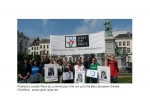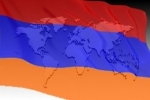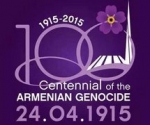25.09.2015AN INTERVIEW WITH THE PRESIDENT OF THE ARMENIAN COMMUNITY OF CHINA, MR. HENRI ARSLANIAN
1. Please tell us a bit about the community and its main goals.
The Armenian Community of China has three main pillars: to unite and bring together individuals of Armenian heritage living in China, to share with the world at large the remarkable history of Armenians in China and to be the natural bridge between Armenia and China.
 22.09.2015THE GROWTH OF EXTREMISM AND THE FACTOR OF “INTELLECTUAL PARITY”
22.09.2015THE GROWTH OF EXTREMISM AND THE FACTOR OF “INTELLECTUAL PARITY”
Gagik Harutyunyan
The global security today depends to a large extent on the developments in Middle East in the context of the Islamic State’s (IS) actions. However, the IS is just the tip of the iceberg; the Middle Eastern processes are closely related to what happens in Central and Southeast Asia and continental “yellow, hot Africa.” In addition, escalation due to actions of extremist groups occurs not only in these regions. In terms of a number of indicators the same logic applies to the events in Ukraine.
 07.09.2015TRANSPORTATION MODES IN ARMENIA
07.09.2015TRANSPORTATION MODES IN ARMENIA
By Areg Gharabegian
Being a landlocked country, Armenia has an economy that depends on transport and crossborder access. Armenia has a few railway lines and an extensive road network. While rate of car ownership has been growing steadily in recent years, it is still relatively low. Public transport plays a critical role, especially in cities. The transportation network capacity is adequate for accommodating estimated demand up to 2020, but the infrastructure has deteriorated due to lack of funds.
 03.09.2015GLOBAL COMPETITIVENESS AND ARMENIA
03.09.2015GLOBAL COMPETITIVENESS AND ARMENIA
By Areg Gharabegian
A comprehensive Global Competitiveness study has been conducted by World Economic Forum utilizing various indicators to rank 144 countries in different areas. This report is a short summary of the findings of that comprehensive study with emphasis on Armenia and its neighboring countries. The study was done at a time when the global economy seems to be finally leaving behind the worst and longest- lasting financial and economic crisis of the past 80 years.
 16.07.2015PROPAGANDA, AGITATION, MANIPULATION AND PERSUASION
16.07.2015PROPAGANDA, AGITATION, MANIPULATION AND PERSUASION
Anna Zhamakochyan
The notion of propaganda (Latin propagare, meaning to spread or to propagate) has originated in ecclesial context, in relation to preaching and missionary activities. The first known usage of this term is dated 1718, which was related to the Congregation for the Propagation of the Faith (Congregatio de propaganda fide) established in early 1620s to control missionary activities in foreign countries.
 14.07.2015NAGORNO-KARABAKH: BETWEEN A ROCK AND A HARD PLACE
14.07.2015NAGORNO-KARABAKH: BETWEEN A ROCK AND A HARD PLACE
Haykaram Nahapetyan
On the July 4, OSCE representation in Baku ceased to exist. What does the Azeri government's sustained assault on liberties mean for the Nagorno-Karabakh conflict?
 10.07.2015SOCIAL MEDIA IN ARMENIA (2015 data)
10.07.2015SOCIAL MEDIA IN ARMENIA (2015 data)
Samvel Martirosyan
Social networking continues to develop in Armenia. The numbers of social media users grow, and their influence on public life and flows of information increases, too. On the other hand, it appears Armenia is approaching a saturation point.
 08.07.2015DIASPORA’S CONTRIBUTION IN DEVELOPMENT OF THE SCIENCE SYSTEM IN ARMENIA
08.07.2015DIASPORA’S CONTRIBUTION IN DEVELOPMENT OF THE SCIENCE SYSTEM IN ARMENIA
Vahram Hovyan
Science is one of the important areas of Homeland-Diaspora ties. This critical infrastructure is aimed at securing the development of countries. Without development, any country is doomed to stagnation and “colonization” by more powerful states.
 18.06.2015STRATEGIC RESEARCH CENTERS IN TURKEY
18.06.2015STRATEGIC RESEARCH CENTERS IN TURKEY
Arestakes Simavoryan
Systemic development of strategic research centers (SRC) in Turkey started in 1960s. Among the Middle Eastern countries Turkey probably has the oldest think tanks along with Israel. Among the various research areas and directions they also study the development traits, typology, strategic priorities and other aspects of the Armenian think tanks.
 15.06.2015LARGE CAPITAL OF DIASPORA AND DEVELOPMENT ISSUES OF ARMENIA: HISTORY AND MODERN TIMES
15.06.2015LARGE CAPITAL OF DIASPORA AND DEVELOPMENT ISSUES OF ARMENIA: HISTORY AND MODERN TIMES
Vahram Hovyan
For the nations that have diaspora, the economy plays a unique role in the area homeland-diaspora relations. The economic capital of diaspora is viewed as a crucial resource for development of such countries. The point is, however, that other than economic interests, the national feelings and natural human desire to help strengthen one’s homeland often play an important role in the issues related to foreign investment in a given country.
 15.05.2015TELECOMMUNICATIONS INDUSTRY OF ARMENIA IN 2014
15.05.2015TELECOMMUNICATIONS INDUSTRY OF ARMENIA IN 2014
Samvel Martirosyan
Telecommunications industry of Armenia continues its dynamic growth. Mobile communications develop vibrantly.The number of mobile service subscribers in Armenia reached 3,424,236 in the fourth quarter of 2014, growing by 75,437 subscribers in a half-year period.
 07.05.2015ARMENIAN STUDIES IN THE SYSTEM OF NATIONAL SECURITY
07.05.2015ARMENIAN STUDIES IN THE SYSTEM OF NATIONAL SECURITY
Gagik A. Harutyunyan
Armenian Studies constitute a certain area of academic research. Branches of Armenian Studies - history, literature, architecture, etc., are manifestations of our civilizational identity, which in turn had brought new content to our system of values (and continue doing so) that are the basic components of the national security system. Thus, Armenian Studies are essentially a national civilizational and state-building discipline.
 09.04.2015THE ARMENIAN PORTENT AND PARADIGM: TOWARD RE-CONCEPTUALIZING THE ARMENIAN TRAGEDY
09.04.2015THE ARMENIAN PORTENT AND PARADIGM: TOWARD RE-CONCEPTUALIZING THE ARMENIAN TRAGEDY
Marek Jan Chodakiewicz
The Armenian Tragedy is a sin crying to the Heavens for vengeance. Not only a horrible crime was committed, but there has been no contrition to speak of. This answers one question: What happened? But the matter is not closed. Christian understanding of the horror is not enough for scholarly and legal reasons.
 31.03.2015IT INDEPENDENCE IS NATIONAL SECURITY
31.03.2015IT INDEPENDENCE IS NATIONAL SECURITY
Author: Ulson Gunnar
The NSA’s “Equation Group” is apparently behind the infection with malware of hard drive firmware on computers used by nations considered “enemies” by the United State. The installation of the malware is believed to have required access to trade secrets of IT manufacturers as well as physical access to the soon-to-be infected computers. Popular Science in their article “The World’s Most Sophisticated Malware Ever Infects Hard Drive Firmware“ suggests that the NSA intercepted computers in transit through global logistical chains.
 02.03.2015CENTERS FOR ARMENIAN STUDIES IN THE POST-SOVIET COUNTRIES
02.03.2015CENTERS FOR ARMENIAN STUDIES IN THE POST-SOVIET COUNTRIES
Vahram Hovyan
In the ex-USSR, centers for Armenian Studies exist mainly in three countries: Russia, Ukraine and Georgia. In all these three countries Armenian Studies have traditionally been a well-developed scientific discipline. Interest toward Armenian Studies in these countries has been triggered by a combination of several factors, including:
Analytics 1 - 15 of 615
First page | Prev | 1 2 3 4 5 | Next | End | All
